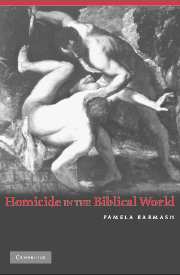Book contents
- Frontmatter
- Contents
- Abbreviations
- Acknowledgments
- Introduction
- CHAPTER ONE A First Case: The Story of Cain and Abel
- CHAPTER TWO Blood Feud and State Control
- CHAPTER THREE The Development of Places of Refuge in the Bible
- CHAPTER FOUR Pollution and Homicide
- CHAPTER FIVE Typologies of Homicide
- CHAPTER SIX Lex Talionis
- CHAPTER SEVEN Interterritorial Law: The Homicide of a Foreign Citizen
- Conclusion
- Appendix: Cuneiform Sources on Homicide
- Bibliography
- General Index
- Index of Citations
CHAPTER FIVE - Typologies of Homicide
Published online by Cambridge University Press: 17 November 2009
- Frontmatter
- Contents
- Abbreviations
- Acknowledgments
- Introduction
- CHAPTER ONE A First Case: The Story of Cain and Abel
- CHAPTER TWO Blood Feud and State Control
- CHAPTER THREE The Development of Places of Refuge in the Bible
- CHAPTER FOUR Pollution and Homicide
- CHAPTER FIVE Typologies of Homicide
- CHAPTER SIX Lex Talionis
- CHAPTER SEVEN Interterritorial Law: The Homicide of a Foreign Citizen
- Conclusion
- Appendix: Cuneiform Sources on Homicide
- Bibliography
- General Index
- Index of Citations
Summary
IN THE story of Cain and Abel, an omniscient narrator explores Cain's responsibility for Abel's death by constructing conversations between God and Cain, in which God explains the capricious and potent impulse to murder and Cain reacts to God's reference to Abel and to the declaration of his punishment. In contrast, three biblical legal texts, Exod 21:12–14, Num 35:9–34, and Deut 19:1–13, analyze the responsibility of the killer by extrapolating the intent of the killer from the manner of killing or from the prior relationship between victim and murderer. They do not have the luxury of omniscience as does the author of Genesis 4.
These three legal texts manifest the intent to articulate more precisely and accurately a distinction between intentional and unintentional killing. They provide conflicting typologies of homicide, probably for two interrelated reasons: 1) Without direct access to a person's thoughts, it is fiendishly difficult to know what he intended; and 2) although the positing of ground rules is easy, the difficulty comes in applying these rules to actual persons and events. At the same time, the legal texts share the principle that only intentional killing by direct action is culpable, and they divide acts of homicide into two categories, one for which the penalty is death and the other for which it is not.
Accidental homicide is defined in Exod 21:12–14 as “if [the killer] did not do it by design, but God caused it to meet his hand” (Exod 21:13).
- Type
- Chapter
- Information
- Homicide in the Biblical World , pp. 116 - 153Publisher: Cambridge University PressPrint publication year: 2004



